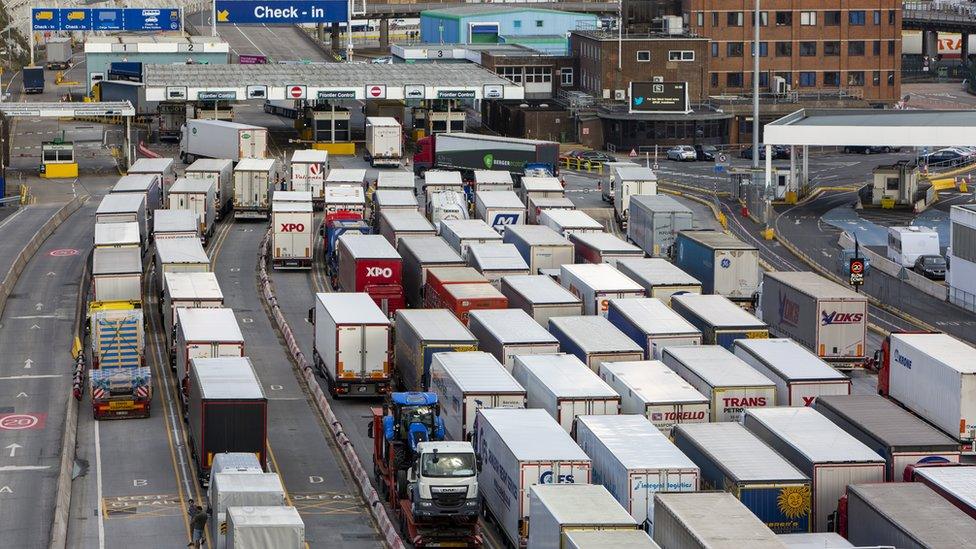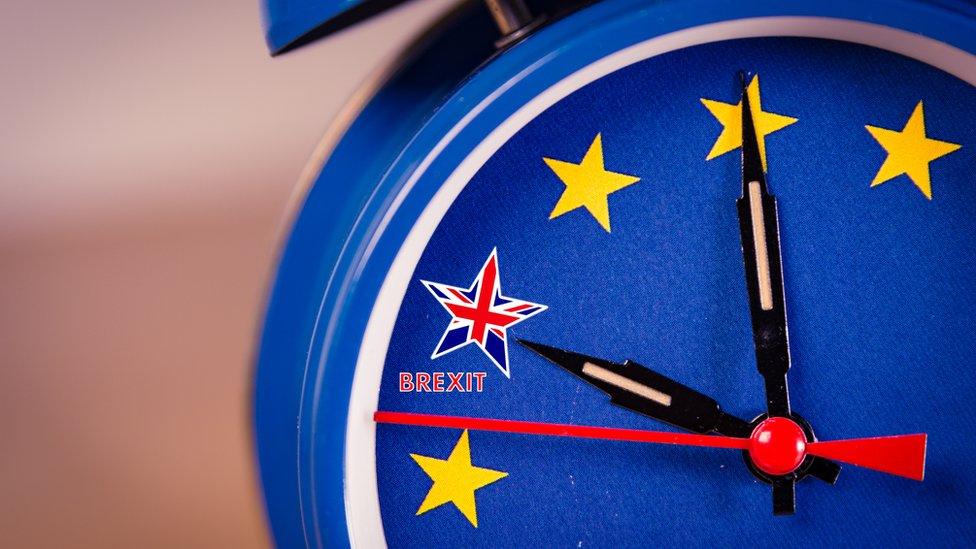Brexit border software developers warn of delays
- Published
- comments

Lorries queue at Dover in September
Essential post-Brexit freight software is unlikely to be ready on time for 1 January, those building it have warned.
A delay could hinder efforts to get products on to shop shelves and might push up prices.
The Association of Freight Software Suppliers (AFSS) said its members could not guarantee delivery because officials had failed to give it details and direction for the project.
But the government insisted the work was still "on track" for 1 January.
Her Majesty's Revenue and Customs (HMRC) is the department involved.
'Significant costs'
The software is supposed to help transport companies submit their paperwork digitally, which is necessary for relevant taxes to be calculated.
The idea is to "minimise the time the vehicles, which currently move seamlessly across the border, would need to be stationary while checks are made on the goods inside them", explained Kevin Green, marketing director at Logistics UK.
Having to do so would add delays which "add time and cost to the journey" and has to be paid for by someone, he warned - and the logistics firms would not be able to absorb "significant additional costs".
That could mean consumers facing higher prices.
The AFSS is made up of the companies that develop the software behind the freight and transportation industry.
The UK has officially left the EU, but is in a "transition period" sticking to the EU's rules until 1 January. But final negotiations with the EU have yet to reach a conclusion.
'Can't talk about it'
The AFSS has formally told HMRC that "most of its members" cannot get their software ready on time.
The association said "late delivery and gaps of detailed information" were the cause.
And it warned that even if members could build a "minimum viable product" in time, it was "unrealistic" to expect firms to be fully trained on it by the year's end.
The root of the problem is that HMRC has introduced a new system, called the Customs Declaration Service (CDS).
Unlike the older system, it can handle two sets of tariffs for the UK and EU at once. That makes it potentially very useful for handling trade to and from Northern Ireland in particular.
The key issue is that while the CDS system is ready, some of the software that traders need to submit their records to it is not.
The AFSS explained the problem was that some functions could not be designed until it was known exactly what they needed to do, and that could not happen until trade negotiations ended.
However, the association's chairman Stephen Bartlett said he "can't fault" the HMRC for the problem.
"When we ask how some of the systems are going to work, we're told, 'We can't talk about it'," he explained.
"From where I sit, they're trying to implement government policy... I know they're working really hard."


Some of the biggest retailers in the UK privately say they will not be able to get the Customs Declaration Service to work in time.
Retailers will meet Cabinet ministers Michael Gove and Brandon Lewis on Wednesday.
Although the government says its software is ready, people in the industry say the systems as a whole are not - and now will not be in time for 1 January.
Indeed, they have been saying this for most of the year. Testing on systems such as this, where no previous declarations were required, would normally take three to six months, they say.
As soon as the government ruled out extending the transition phase in June, concerns were expressed that a properly tested system would not be possible by 1 January.
Today's letter also reflects a business community fear that the government will try to blame it for any disruption.
Read more: Red tape is back post-Brexit, but will it be ready?

Contingency plans
In a statement, HMRC said it was "continuing to engage extensively with the software developer community and community system providers to ensure that they have everything they need to develop their products".
The plans include a support service to file customs declarations on behalf of traders, so they will not have to do it directly themselves.
HMRC also said it had contingency plans in place to keep goods flowing.
- Published1 February 2019

- Published1 July 2020

- Published27 October 2020